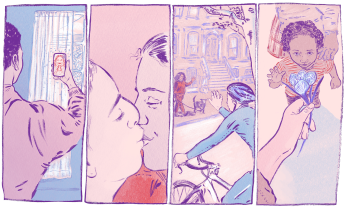
Most relationships in which loneliness has taken up residence can be shifted to a better reality, says marriage researcher Carol Bruess. All it takes some patience and effort.
This post is part of TED’s “How to Be a Better Human” series, each of which contains a piece of helpful advice from people in the TED community; browse through all the posts here.
About my soaring, loving marriage of 28 years, people frequently say: “You’re soooo lucky!”
As I’ve written before, I don’t believe that luck is the key to a good marriage; hard work is. And such labor is, fortunately, among the most rewarding kind of work we do, of co-creating a relationship steeped in friendship, mutual adoration, and an unrelenting respect for our partner’s talents and quirks.
When it comes to that work, I have a bit of an advantage. I’m a social scientist who studies and ponders, day in and out, how our micro-choices can yield big outcomes toward strong and vibrant relationships.
But you don’t have to be a relationship expert to know when something isn’t quite right in your partnership or marriage. If your union isn’t one in which humor comes easily; isn’t one in which your partner’s idiosyncrasies are still (at least a little bit) endearing; or isn’t one in which your emotional needs are being met, perhaps you’re in a lonely marriage.
Sounds oxymoronic, right? A lonely marriage?
In fact, lonely marriages are real. And too common. Talk to someone who has experienced one and they’ll tell you it’s worse being lonely in a marriage than it is being lonely by yourself. According to surveys, some 40 percent of people know the pain of being lonely in relationship because they’ve been there at some point. Although no two happy marriages are identical, every lonely marriage has one thing in common: at least one spouse feels abandoned emotionally.
Emotional abandonment can be confusing, vague and hard to pinpoint because the person is, quite often, lying next to you in bed every night or co-raising kids. They might even be the person with whom you’re still having sex. But it’s also the person with whom — when you get honest with yourself — you know something is off. Something is missing.
Being in a lonely marriage doesn’t mean you’re physically excluding your partner from your life, but you’re emotionally excluding them from your thoughts. While you two may talk, you’re not communicating your hopes, fears and dreams. You might not be arguing or yelling or showing any obvious signs of disharmony; quite often, you’re not fighting at all, because you’ve found it’s just easier not to. Being in a lonely marriage also doesn’t mean you’re not being an attentive, loving parent. Many couples who feel disconnected from each other actually respond by throwing the majority of their energies toward their kids.
Let me be clear: Being in a lonely marriage doesn’t mean you don’t love your partner. However, the emotional distance between you has increased to the point that your love is lacking an essential intimacy — a tenderness of words, actions and thoughts. A type of gentleness you know is possible in your two-ness because it was that gentleness which attracted you to each other in the first place (remember?).
And here’s the good news: It’s with that sense of possibility you should remain hopeful, even if you’re reading this with a knowing dread that the emotionally-distant marriage I describe is your current marriage.
Why hopeful? Because most relationships in which loneliness has taken up residence can be shifted. They can be ushered back to a we-ness, replete with positive energy and renewed intimacy.
With a little work and a few tweaks in your behavior, you can come back to a better daily reality, one that looks more like this: a relationship in which you know your partner’s current worries; in which you can laugh together at life’s daily absurdities and annoyances; in which you want to create and anticipate with joy an evening when the kids are elsewhere and the two of you do whatever it is just the two of you find joy in doing.
Yes, you can get back to that.
As you make the decision to reclaim connection with your partner, resolve first and foremost to be patient. Not unlike the work of getting back in physical shape after an injury or illness — you wouldn’t just head out and run a 10K immediately after a three-year hiatus from exercising — re-building your relationship muscles after allowing them to atrophy will take a some time and definitely require a little effort. But little is the key word. Muscle memory is a powerful thing, and that goes for intimacy muscles too.
Here are three tips as you begin to flex those relationship-connection muscles:
Ask questions
If you are feeling lonely, your partner is probably also feeling lonely—and hopeless and helpless, not sure where to begin. So, begin with you. Take the initiative by simply asking your partner at least one question a day about something not related to managing your lives. Questions like “Did you pay the electricity bill?” and “Can you grab the kids tomorrow after school?” do not count. Ask your partner what they’re currently worried about, excited about, stressed about, looking forward to. Then really listen to their answers.
Start small, and don’t be surprised if your partner is suspicious at first. Re-establishing emotional connection is a shift in energy — a shift in wanting to know what the other person is thinking and feeling again, and sharing your own thoughts and feelings. Make it a goal to engage your partner in more of these curiosity-conversations each day. Most likely, they will begin to reciprocate, asking you similar questions. It might not happen right away, but trust that it will over time. Humans are pretty predictable; we tend to give back what we are given.
Get into their world
More specifically, get into the world of their thoughts. Yes, this will naturally happen by asking questions. But also important is making a quiet, internal effort to take your partner’s perspective—an exercise that you can’t skip as you work to re-build an emotional bond.
What does this entail? Pick just 60 seconds every day, close your eyes, and take just one minute to imagine what your partner’s world is currently like—from their vantage point. What might they be feeling/experiencing/needing right now? What is their current reality? What might their challenges be? Where are they finding joy? What might they be worried about, yearning for, or what might be weighing them down? Come into this minute of perspective-taking with a generosity of heart and mind.
You don’t even have to talk to your spouse about what you see in your mind’s eye — at least not immediately, and sometimes not ever. Because by simply engaging in this brief activity you will have more empathy and patience as you go about navigating daily life with your partner. Most important: this increased empathy can be the root of renewed emotional connection.
Create rituals of connection
Start small here. Choose to create tiny moments of intentional shared experiences together. If your partner is the one who usually makes dinner, join them in the kitchen and ask how you can help tonight. Maybe pull up their favorite artist on Spotify and set the tone for more joyful — even if they’re tiny — feelings between the two of you. These gestures of connection are the powerful stuff of thriving marriages, each one contributing to a larger reality of being a we again.
If you’re worried about doing any of the above and/or you’ve been in the lonely season of your marriage for a while, it might be wise — and necessary — for you to get support in this process. There are excellent, licensed marriage and family therapists working in most communities. Ask a friend or colleague for referrals, or do a simple google search. Another option for people in the US: Enter your zip code here to get a list of practitioners near you. Seeing a marriage and family therapist is covered by many health insurance plans.
If your spouse or partner is reluctant about seeing a therapist, encourage them to think of therapy as education, not as someone fixing broken humans or judging you on the way you communicate. Quite the contrary. Great therapy is a warm, safe, and welcoming opportunity to simply learn positive new ways of being together, building on what you already have created as a couple. If you have children, tap into your partner’s desire to raise healthy, happy young people, and remind your partner that the single most important thing you can do for your children is to have a healthy relationship yourselves. Yes, your children are watching.
And, yes, you can reclaim intimacy again. But it’s going to take some work. Just keep reminding yourself: It’s the most valuable work you can do.
Watch her TEDxMinneapolis Salon Talk here:














